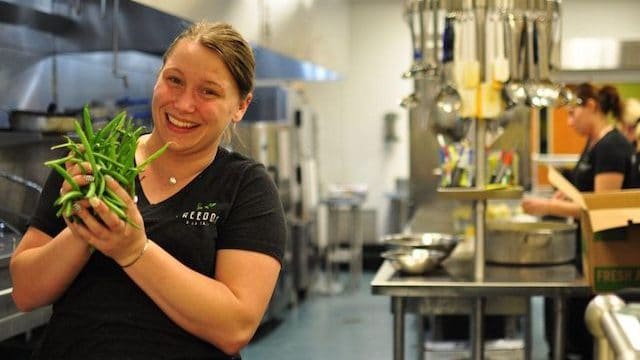A central Ohio nonprofit called Freedom a la Cart is employing survivors of human trafficking in their catering operations, helping them get back on their feet and get valuable work experience.
Originally started as a food cart, Freedom a la Cart uses its catering business to fund its programming, including a mentoring program that pairs participants with women in the community as well as a support group that offers survivors a forum to meet and discuss experiences in a safe space.
Last year Freedom a la Cart has helped 210 women, with 33 of them participating in the work training program.
Forbes reports:
According to Franklin County Municipal Court’s CATCH program, which provides a path of rehabilitation for survivors of human trafficking, prostitution and sexual exploitation in the Columbus region, in Franklin County alone approximately 1,200 women are arrested each year for solicitation. More than 92% are identified as sex trafficking victims who were “first trafficked for sex at a young age.”
Under the CATCH structure, if a defendant pleads guilty, she is granted a probation period of two years. During this time, the women are required to follow a treatment plan that includes a residential program, drug screenings and counseling. Freedom a la Cart partners with CATCH to provide supportive services and workforce development training for some of these women.
“We are all about empowering women,” explains Haines. “Women that have been trafficked are very accustomed to transactional relationships and we want to make sure that we don’t become a transactional relationship. We want to provide for their needs but also help them figure out how to fulfill those needs for themselves in moving forward.”
April Thacker, a survivor of human trafficking herself, has worked her way up the ranks and currently serves as Freedom a la Cart’s case manager. She enrolled in Freedom a la Cart’s two-year training program five years ago, when she says no one would give her a job because of her criminal record and long gap in employment.
“I really do believe that if it wasn’t for Freedom I wouldn’t be where I am today,” she says. “I had the determination to succeed but it would have looked a lot different than where I am now.”
When asked why Freedom a la Cart uses food to heal and train trafficking survivors, Paula Haines, the executive director explained, “As women, many of us have had those moments in the kitchen when we’re cooking with our mothers, grandmothers, cousins or aunts.”
“That’s where we solve all of the world’s problems. It’s where we support each other and bond. We are creating that here. This is a safe place where we not only cook good food but we talk through issues and share what’s on our minds.”







Freedom United is interested in hearing from our community and welcomes relevant, informed comments, advice, and insights that advance the conversation around our campaigns and advocacy. We value inclusivity and respect within our community. To be approved, your comments should be civil.